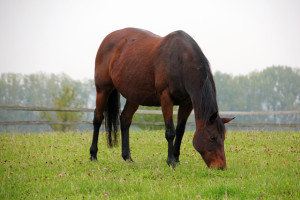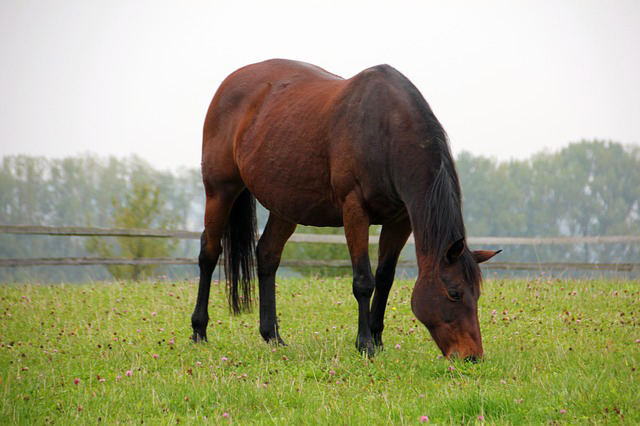Myth Busting this Important Nutrient for Horses and Humans
by Gina Fresquez, MS, CHHC
 The topic of protein in equine nutrition (and human nutrition) has gotten a lot of attention over the years. I find it’s a hot topic of discussion and popular way horse owners evaluate and choose horse hay and feed, but also greatly misunderstood. Here are some important things to know about protein for your horse:
The topic of protein in equine nutrition (and human nutrition) has gotten a lot of attention over the years. I find it’s a hot topic of discussion and popular way horse owners evaluate and choose horse hay and feed, but also greatly misunderstood. Here are some important things to know about protein for your horse:
- Amino Acids: Protein consists of amino acids, which are the building blocks for many important tissues and functions in the body. Horses have a specific amino acid requirement, essentially needing these amino acids present in the diet. The most limiting is lysine.
- Pounds not percent: The percent (%) of protein is not as important as the amount of protein in the whole diet. When reading labels horse owners often mistake this number as the % of total diet but this is the % per pound of product. To figure out how much protein your horse is getting you must multiply the % by how many pounds your horse eats per day. For example: if your horse eats 4 pounds of a 12% protein feed then it is consuming 0.48 pounds of protein; or 1 pound of a 32% protein feed equals 0.32 pounds of consumed protein. You can also calculate this for the forage portion of the diet. Depending on the work load, the average 1000 lb. horse needs about 1 – 2 pounds of total protein per day.
- Quality over quantity: The amino acid content, which determines protein quality, is more important than the amount of protein. Look for feeds that contain lysine and other amino acids like methionine and threonine. There are feeds out there that are high in protein but are still lacking some essential amino acids for building quality muscle, hair, hoof, tissues and enzymes. If the amino acids are not listed you can evaluate the horse’s overall bloom in the hair coat, muscling (especially over the top line), and hooves to determine if its needs are being met.
- Bust The Energy Myth: Protein is not an efficient energy source for your horse. The horse actually has to use energy to metabolize energy coming from protein in the body therefore it chooses not to do so unless as a last resort. The lower the protein does not necessarily mean it is lower in energy (calories). If your horse needs more energy then look for feeds that are higher in calories, fat, starch and sugar; on the other hand if your horse has too much energy created from the diet, seek out one that is low in starch and sugar. Think about it – do you get more energy after eating a steak or eating a box of cookies?
Understanding protein and how it plays into your horse’s diet is a key concept every horse owner should know. This will help you choose which forage and feeds will work best for your horse to achieve the results you desire.
Did you know? Protein is also a very important nutrient for humans as well. Protein helps you retain and build muscle, especially as you lose weight, and the more muscle you have the more fat your will burn. It is essential to eat protein at every meal to support weight loss as well as keeping you satisfied and fuller longer so you are less likely to overeat and snack in between meals. I recommend shooting for about 3/4 of your ideal body weight in grams of protein per day or more. For example, if you weigh 160 pounds but should weigh 140 pounds, then you would aim for at least 105 grams or more of protein per day. Long story short, basically you want to make sure you aim to eat protein at every meal. Protein can come from many sources and it will depend on your preferences and taste but some great choices are beans, lentils, nuts, seeds, eggs, leaner cuts of poultry or beef, cheese, yogurt, quinoa, oatmeal and leafy greens.
Published August 2013 Issue
Gina Fresquez, MS, is a lifelong horse enthusiast with a passion for helping horse owners make sense of equine nutrition. She received her BS in equine science and Master’s degree in equine nutrition from the University of Arizona and has worked as a technical equine specialist for Purina Animal Nutrition since 2006. Gina works closely with horse owners, stables and veterinarians determining feed rations, testing hay, and addressing nutritional related challenges in the Pacific Northwest.
Contact Gina and find out more information: www.horse.purinamills.com.
Cell: (206) 743-6453
Email: [email protected]






